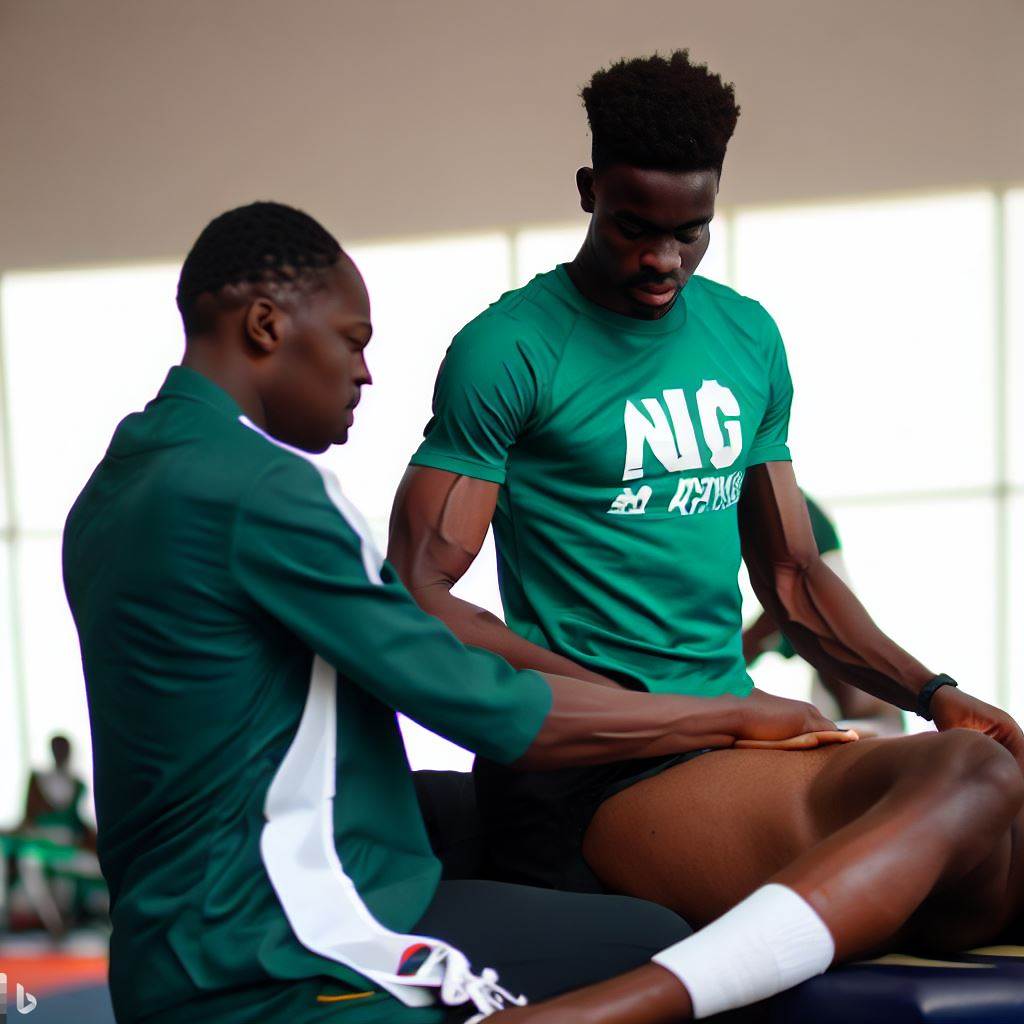Introduction
The Nigerian Sports Industry is a vast and vibrant ecosystem that encompasses various activities related to sports.
Navigating this industry is essential for anyone looking to establish a career or business in sports in Nigeria.
It is crucial to understand the dynamics and nuances of the industry to succeed.
The importance of navigating the Nigerian Sports Industry cannot be overstated as it opens up numerous opportunities for individuals and businesses alike.
With a population of over 200 million people, Nigeria is a potential goldmine for anyone involved in sports. The country has a robust sports culture that provides the foundation for a thriving sports industry.
The purpose of this post is to serve as a guide for anyone interested in navigating the Nigerian Sports Industry.
We will provide insights on the key players, policy frameworks, and regulations in the industry. We will also explore opportunities and challenges in the industry and provide recommendations on how to succeed.
Whether you are an athlete, coach, sports agent, or a business owner looking to capitalize on the sports industry, this post will provide valuable information that will enable you to navigate the Nigerian Sports Industry successfully.
With the right knowledge and strategy, you can tap into the vast potential of the Nigerian Sports Industry and achieve your goals.
Read: Future Prospects for Nigeria’s Athletics Industry
Understanding the Nigerian Sports Industry
Sports has always been a significant part of Nigerian culture, and the country boasts of producing world-class athletes across various sports disciplines.
However, the Nigerian sports industry has often been viewed as underdeveloped, poorly organized, and heavily reliant on government funding.
In this section, we will provide an overview of the Nigerian sports industry, the key players in the industry, and the current state of the industry.
Overview of the Nigerian Sports Industry
- The Nigerian sports industry encompasses various sports disciplines, including football, athletics, boxing, basketball, and many others.
- The industry contributes to the country’s socio-economic development by providing employment opportunities, generating revenue, and promoting unity among Nigerians.
- The government’s involvement in the industry dates back to the 1950s, with the establishment of the National Sports Commission (NSC) in 1962 to coordinate sports activities in the country.
- Despite government efforts to develop the industry, private sector involvement remains low, and sports infrastructure is poorly maintained.
Key Players in the Industry
- The government plays a crucial role in the industry, providing funding, enacting policies, and regulating sports activities in the country.
- The National Sports Commission (NSC) serves as the regulatory body for sports in Nigeria.
- Individual sports federations are responsible for organizing and regulating sports activities in their respective disciplines.
- Sports clubs and academies provide training and development opportunities for athletes, with the leading clubs being Enyimba FC and Kano Pillars FC in football and the D’Tigers in basketball.
Current State of the Industry
- The Nigerian sports industry faces various challenges, including inadequate funding, poorly maintained sports infrastructure, and a growing incidence of corruption and mismanagement.
- The industry has witnessed significant achievements, with Nigerian athletes excelling in international competitions, such as the Olympics, Commonwealth Games, and African Cup of Nations.
- The government’s recent focus on promoting private sector involvement in the sports industry is expected to drive growth and development in the sector.
- The establishment of sports academies and the development of sports infrastructure across the country is also expected to provide opportunities for young and aspiring athletes.
In essence, the Nigerian sports industry has enormous potentials for growth and development, with the government, private sector, and individuals playing crucial roles in its success.
Understanding the industry’s challenges and opportunities is, therefore, essential for anyone looking to navigate and succeed in the industry.
Read: Exploring Nigeria’s Sports Talent Development Programs
Networking in the Nigerian Sports Industry
The sports industry in Nigeria is fast-growing, with more opportunities for athletes, coaches, and other stakeholders.
To navigate the industry successfully, it is essential to have a strong network of contacts. This network helps to create opportunities for growth, collaboration, and expansion in the sports industry.
Building relationships with key players
It is important to identify the key players in the Nigerian sports industry and build strong relationships with them.
These key players include team owners, managers, sponsors, and government officials. Building strong relationships with these individuals requires consistent engagement, communication, and active listening.
Attend their games, offer help and support where possible, and be keen on their interests to create stronger bonds.
Leveraging social media and technology
The internet has revolutionized the way businesses operate, including sports. Social media platforms and technology can be used to connect with a wider audience and create new opportunities.
To leverage social media, develop a strong social media strategy that encompasses several platforms.
Also, create quality content to attract followers and establish yourself as an authority in the industry.
Attending virtual conferences and training sessions is a great way to meet new people in the industry.
Attending events and conferences
Going to events and conferences provides a great opportunity to build relationships with key players in the sports industry.
Attend sports games, after-parties, trade shows, seminars, and networking events.
Be prepared with business cards and a clear message to promote yourself or your organization.
During these events, be an active participant by asking questions and offering insights on the industry.
In the Nigerian sports industry, networking is essential to succeed.
Build relationships with key players, leverage social media and technology, and attend events and conferences to expand your network.
By doing so, you will create opportunities for growth and success in the sports industry.
Read: The Rise of Nigerian Athletes on the Global Stage

Challenges of Navigating the Nigerian Sports Industry
Navigating the Nigerian Sports Industry can be a daunting task, filled with numerous challenges that can make it seem almost impossible to succeed. Here are some of the challenges that you may face:
- Corruption: This is one of the major challenges that many individuals face when attempting to navigate the Nigerian Sports Industry. Corruption has become a norm in many aspects of the industry, from selecting team members to securing endorsements and sponsorships.
- Limited resources: Another challenge that can make navigating the Nigerian Sports Industry difficult is a lack of resources. This includes financial resources, as well as a lack of access to facilities and equipment that are necessary to train and compete at a high level.
- Lack of infrastructure: Inadequate infrastructure is a significant challenge to navigating the Nigerian Sports Industry. Most sporting facilities in Nigeria are outdated and are not well maintained, making it challenging to practice and perform at an optimal level.
- Competition: With a population of over 200 million, Nigeria has a lot of talented athletes. This creates fierce competition, making it harder for individuals to emerge at the top of their sport.
Despite these challenges, there are ways to navigate the Nigerian Sports Industry:
- Identify opportunities: As an athlete or sports professional, you need to stay informed and updated on the latest opportunities within the industry. This includes knowing about upcoming competitions, talent hunts, and sponsorship opportunities.
- Build relationships: Building relationships with influential people within the industry can be a significant advantage. It is essential to network and make connections with individuals who can help you succeed.
- Focus on personal development: Upskilling and continuing education is critical to navigating the Nigerian Sports Industry. Enhancing your skills and improving your knowledge can help you stand out from your competition.
- Work hard: There are no shortcuts to success in the Nigerian Sports Industry. Hard work and dedication are the keys to success. It is vital to commit yourself to your craft and put in the necessary work required to succeed.
In summary, the Nigerian Sports Industry is a challenging environment to navigate.
However, identifying opportunities, creating relationships, focusing on personal development, and working hard can help you overcome these challenges and succeed in the industry.
Tips for Success in the Nigerian Sports Industry
The Nigerian sports industry is a dynamic and exciting sector with endless opportunities for growth and development for individuals looking to make a career in the industry.
However, excelling in this industry is not an easy feat, and it requires commitment, perseverance, and a willingness to learn and adapt to changing trends.
In this section, we will discuss some essential tips for success in the Nigerian sports industry.
Identifying Opportunities for Growth
The Nigerian sports industry is vast, and it offers several opportunities for growth and development.
However, to succeed in the industry, you need to identify these opportunities and leverage them to advance your career.
Whether it is working as a coach, sports analyst, sports administrator, or athlete representative, identifying the right opportunity that aligns with your skills and passion is crucial to success in this industry.
However, identifying opportunities for growth is not enough. You must also be willing to work hard and put in the effort needed to achieve success.
Consistency and Perseverance
Consistency and perseverance are essential attributes that anyone looking to succeed in the Nigerian sports industry must possess.
In a highly competitive industry that is constantly changing, it is easy to lose focus and give up. However, consistent effort and perseverance will help you stay motivated and committed to achieving your goals.
Consistency involves doing something regularly, while perseverance involves continuing in the face of opposition or difficulty.
These qualities will help you push through the tough times in the industry and emerge as a successful professional.
Staying Updated with Industry Trends
The Nigerian sports industry is fast-paced, and keeping up with industry trends is crucial to success.
Staying updated with trends in the industry will help you identify emerging opportunities, understand the needs of your clients, and improve your knowledge and skills.
You can stay updated with industry trends by attending conferences, workshops, and seminars, reading sports news, and connecting with professionals in the industry.
Additionally, you can leverage social media platforms such as LinkedIn and Twitter to access industry news and connect with professionals.
Continuous Learning
Continuous learning is perhaps one of the most crucial tips for success in the Nigerian sports industry.
As the industry evolves, new challenges and opportunities present themselves, and being able to adapt to these changes is critical to maintaining relevance as a professional.
Continuous learning involves actively seeking out new information and skills and incorporating them into your professional practice.
Whether it is enrolling in a professional course, reading books, or attending webinars, continuous learning will help you stay ahead of the curve in the industry and remain competitive.
The Nigerian sports industry offers several opportunities for growth and development.
Success in this industry requires commitment, perseverance, and a willingness to learn and adapt to changing trends.
Identifying opportunities for growth, consistency and perseverance, staying updated with industry trends, and continuous learning are essential tips for success in the Nigerian sports industry.
Read: Understanding the Role of Coaches in Nigerian Sports
Conclusion
Overall, navigating the Nigerian sports industry is crucial for anyone seeking success in the field.
By understanding the unique challenges and opportunities of the market, individuals can position themselves for advancement.
To succeed, it is essential to cultivate a strong network, prioritize relationship-building, and stay up-to-date with industry trends.
Finally, taking proactive steps like attending events and volunteering can provide valuable experience and exposure.
As readers, we encourage you to take action in navigating the industry by implementing these tips and seeking out new opportunities. With dedication and perseverance, the Nigerian sports industry can be a rewarding and fulfilling career path.




